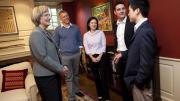Every year, more than 2.4 million people around the globe die of diseases that could be prevented by vaccines. Now, a cross-disciplinary group of Harvard student entrepreneurs—one from the Business School, one from the Kennedy School, a postdoctoral research fellow in chemistry, and an aspiring lawyer—believe they have a way to substantially reduce this number. The answer? Scaling up access to a new technology that uses a protein found in silk to preserve routine vaccines without refrigeration. In Third World countries, where cold storage is often scarce, this technology could mean the difference between life and death.
And at Harvard, this promising proposal won Kennedy School student Livio Valenti and his Vaxess Technology teammates the top prize in the President’s Challenge for social entrepreneurship. The contest, sponsored by President Drew Faust and hosted by the Harvard Innovation Lab (i-Lab), sought to help students develop their ideas and create ventures of high social impact in five categories—clean water, personal health, empowered education, global health, and clean air; 170 teams participated. Vaxess, as grand prize winner, will receive $70,000 to support its research, as well as space in Harvard’s Innovation Lab, two expert mentors, and full access to the resources of the lab through August.
In addition to the Vaxess team, three other teams were named runners-up, and will receive $10,000 each to advance their projects: SPOUTS of Water (which proposes to create a self-sustaining ceramic water-filter factory in Uganda); Revolving Fund Pharmacy (which seeks to tackle problems in delivering life-saving medications by creating a supply-chain model for government health facilities in western Kenya); and School Yourself (which aims to bring books alive for a new generation of students accustomed to interactive games by creating immersive and interactive electronic textbooks in math and science for high-school and college students).
The vaccine industry has long struggled with the issue of refrigeration, says Valenti, who explains that 97 percent of vaccines must be stored between two degrees and eight degrees Celsius in order to stay effective. “If the thermometer reads nine degrees once they reach the end user, the vaccines are wasted,” he adds. “Lack of cold-chain infrastructure limits access to these life-saving technologies and adds around 20 percent to global immunization costs.”
Valenti, who worked for the United Nations in Cambodia before coming to Harvard, met his teammates last fall while taking the Harvard Business School course “Commercializing Science.” He had been exploring new export markets for Cambodian silk, which led him to the research of Tufts University professors Fiorenzo Omenetto and David Kaplan, who had developed a technology that extracts fibroin, a protein found in silk, and uses it to stabilize vaccines at temperatures of up to 45 degrees Celsius. Transporting and delivering vaccines on a thin filmstrip of silk-derived protein, Valenti reports, not only eliminates the need for refrigeration, but also simplifies distribution, enabling lower costs and greater accessibility.
In countries such as India and a large portion of Africa, Valenti said in his i-Lab presentation video (see below), 20 percent of newborns fail to receive the most basic vaccine immunizations. He cited the DTP vaccine, “the cornerstone of any basic immunization campaign,” which still fails to reach 90 million children around the world.
The Vaxess team also includes Michael Schrader, M.B.A. ’12, Kathryn Kosuda, a former Harvard postdoctoral fellow in chemistry, and Patrick Ho, J.D. ’12. In addition to the President’s Challenge grand prize, the four have also won the Business School’s Business Plan Contest this year and their proposal is a finalist in the Commonwealth’s annual $1 million global-startup competition and accelerator program MassChallenge. That competition will be decided this October.
Watch a video of their i-Lab presentation:









